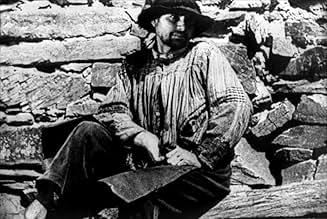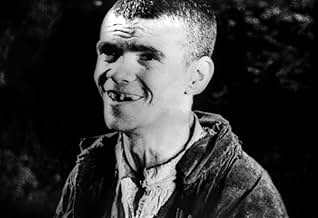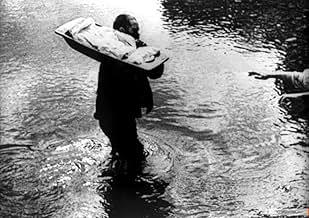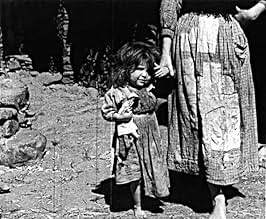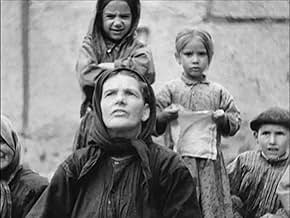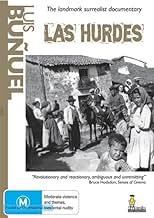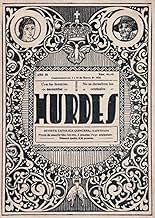VALUTAZIONE IMDb
7,3/10
6552
LA TUA VALUTAZIONE
Un documentario surrealistico che ritrae la regione di Las Hurdes, una remota regione della Spagna dove la civilizzazione è appena sviluppata, mostrando come i locali sopravvivono senza nean... Leggi tuttoUn documentario surrealistico che ritrae la regione di Las Hurdes, una remota regione della Spagna dove la civilizzazione è appena sviluppata, mostrando come i locali sopravvivono senza neanche le più semplici capacità.Un documentario surrealistico che ritrae la regione di Las Hurdes, una remota regione della Spagna dove la civilizzazione è appena sviluppata, mostrando come i locali sopravvivono senza neanche le più semplici capacità.
- Regia
- Sceneggiatura
- Star
Recensioni in evidenza
This is a fascinating documentary from Luis Bunuel about a little known people called the Hurdanos, who live primitive miserable lives in a remote region of Spain. Its hard to imagine that even in the early 20th century when this film was made, there were still people living in "civilized" Europe under the conditions shown in this film. Only a few years before this film was made did these people know of bread. They have only rudimentary farming skills. The narrator states that at no time did the film crew hear anyone sing or play music, so perhaps music is unknown to them. Malnutrition, pestilence, genetic disorders from inbreeding, and lack of proper hygiene plague these poor wretched people. This film shows them dying off in such high numbers, that one has wonder why these people didn't all die off or migrate to more hospitable terrain long ago.
Like so many other documentaries, some scenes were obviously staged for the camera, like the now notorious donkey falling off a cliff. We see the donkey falling in several different shots taken from different angles, which makes it unlikely the cameramen just happened to be there when the donkey fell.
Some people claim this film is an attack on Franco, but Franco didn't come to power until 1936. Actually I don't think this film was trying attack anyone. It merely does what I think its makers set out to do; try to capture the lives of a people who are very different from the rest of us.
Like so many other documentaries, some scenes were obviously staged for the camera, like the now notorious donkey falling off a cliff. We see the donkey falling in several different shots taken from different angles, which makes it unlikely the cameramen just happened to be there when the donkey fell.
Some people claim this film is an attack on Franco, but Franco didn't come to power until 1936. Actually I don't think this film was trying attack anyone. It merely does what I think its makers set out to do; try to capture the lives of a people who are very different from the rest of us.
"Las Hurdes" may be the Surrealist documentary par excellence, a tendentious film discourse about poverty shot in Las Hurdes Altas, a human settlement out of a nightmare, among steep precipices, in an almost deserted landscape. Even based on Maurice Legendre's 1927 anthropological text "Las Jurdes: A Study of Human Geography", Buñuel forced into the harsh situations his own obsessions with insects and donkeys that would appall today any society for the protection of animals. Done at a time when Spain was among the nine countries with the highest level of economic development, by contrast this work shows the state of misery of a community marginalized by landowners, forgotten by authorities, and living in the cruelest of conditions. The cynic commentary makes the facts more striking, but the music score by Darius Milhaud is an obtrusive element. Although banned by the authorities, it was re-released with a Spanish narration read by actor Francisco Rabal.
10groveman
I found it very interesting reading the reactions of others here, from interpreting this as everything from a pure comedy to a pure documentary. The truth is that it denies classification, and for many that just simply does not compute. Therefore, it has obviously done exactly what Bunuel wanted.
The aim of surrealism is to lure you in with the trap of a conventional narrative, and then hit you right in the face with something impossible to just passively accept. This film is the perfect example of this. You are absolutely forced into the role of active observer; forced to draw your own conclusions. Independent thought is pulled to the surface, returning comprehension to it's original purity. Reality lies not in what you are seeing, and not in what you are hearing, but somewhere in-between.
My God, this man was a genius, and so far ahead of his time it's unbelievable. Spielberg shows you what you want to see. Bunuel shows you what you need to see. Find this film and see it. Its value is incalculable.
The aim of surrealism is to lure you in with the trap of a conventional narrative, and then hit you right in the face with something impossible to just passively accept. This film is the perfect example of this. You are absolutely forced into the role of active observer; forced to draw your own conclusions. Independent thought is pulled to the surface, returning comprehension to it's original purity. Reality lies not in what you are seeing, and not in what you are hearing, but somewhere in-between.
My God, this man was a genius, and so far ahead of his time it's unbelievable. Spielberg shows you what you want to see. Bunuel shows you what you need to see. Find this film and see it. Its value is incalculable.
I have been frustrated by the version of the film that is available in my area, entitled "Unpromised Land". The original "Tierra sin Pan" has a completely different commentary which is made "politically correct" in the "Unpromised" version. Avoid "Unpromised Land" as it censors and alters the original intent of the film as conceived by Bunuel!
I have ancestors from my father side who are originally from Las Hurdes. The highlands were exactly like the documentary film portrays them. The lowlands slightly better off, The documentary helped them because the world focused on them and offered some help. Finally a cementery was built and food imported. Problem is the civil war that followed shortly afterwards. Buñuel was a surrealist film director who tried to shift towards realism after joining the communist party. The civil war against communists and fascists further increased poverty but no films were allowed for decades under the dictatorship 1936-1975
Lo sapevi?
- QuizLuis Buñuel was not above slaughtering several animals to deliver his message; he ordered the ailing donkey to be spread with honey so he could film it being stung to death by bees. Nor was the mountain goat falling off the mountain an accident, shot by Buñuel's crew for the desired sequence.
- BlooperIn the sequence where the mountain goat falls to its death, a puff of smoke can be seen on the side of the screen. This is from a gunshot by a crew member, who shot the goat so that it would fall and be filmed as if it 'accidentally' fell off of the mountain.
- ConnessioniFeatured in Histoire(s) du cinéma: Les signes parmi nous (1999)
I più visti
Accedi per valutare e creare un elenco di titoli salvati per ottenere consigli personalizzati
Dettagli
- Data di uscita
- Paese di origine
- Lingua
- Celebre anche come
- Land Without Bread
- Luoghi delle riprese
- La Alberca, Salamanca, Castilla y León, Spagna(main town, on location)
- Azienda produttrice
- Vedi altri crediti dell’azienda su IMDbPro
- Tempo di esecuzione
- 30min
- Colore
- Mix di suoni
- Proporzioni
- 1.37 : 1
Contribuisci a questa pagina
Suggerisci una modifica o aggiungi i contenuti mancanti

